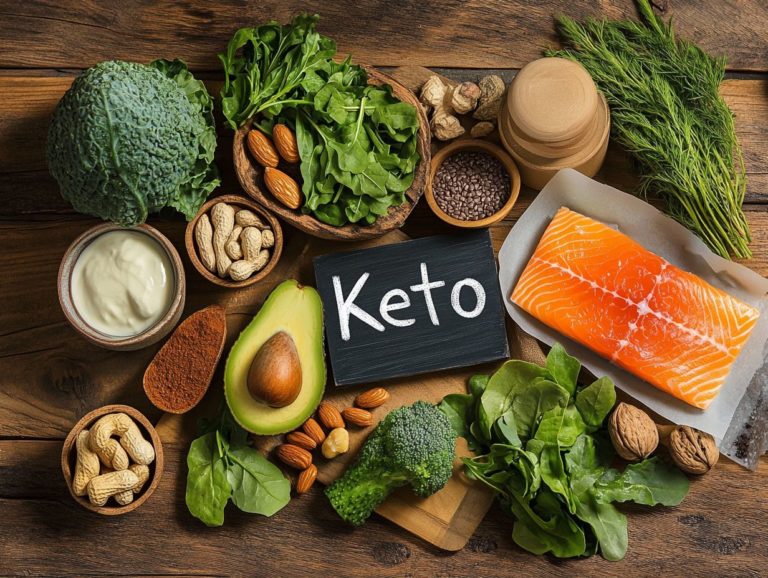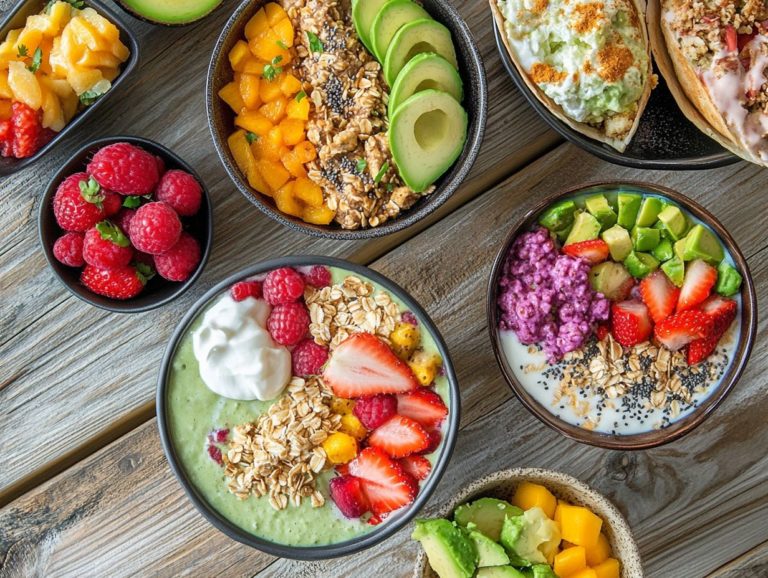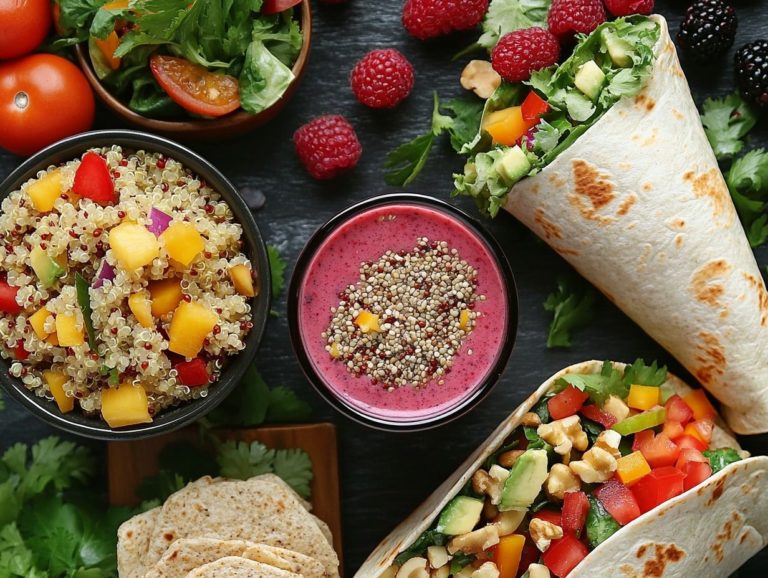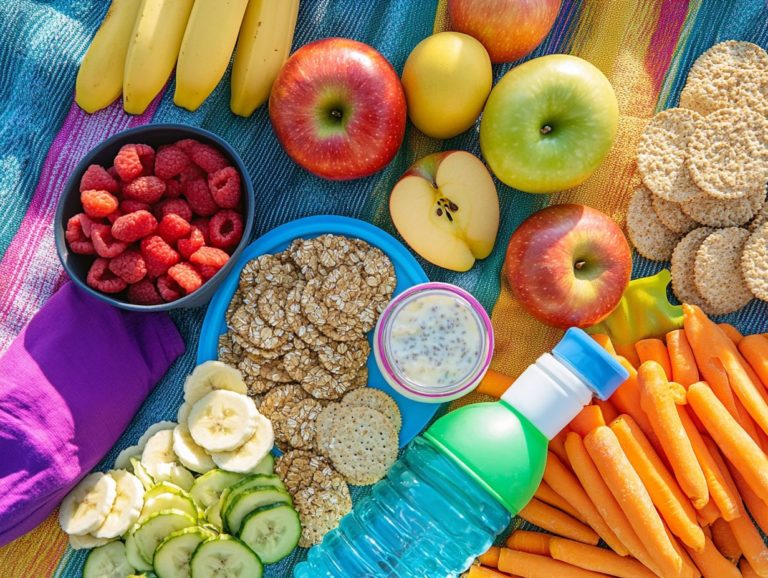Nutrition for First-Time Moms: Essential Guidelines
Navigating the journey of pregnancy can be both exhilarating and a bit daunting, especially for first-time moms like you. Get ready to learn how to nourish yourself and your baby!
One of the most critical areas to focus on is nutrition, as it has a significant impact on the health of both you and your baby. This article will guide you through essential macro (big) and micronutrients (smaller vitamins and minerals), offering insights into recommended daily intake while sharing tips for maintaining a balanced diet.
You ll also find answers to common nutritional concerns, discussions on vital supplements, and advice on postpartum nutrition designed to help you replenish after childbirth. Prepare to empower yourself with the knowledge necessary for a healthy pregnancy!
Contents
- Key Takeaways:
- Macro and Micro Nutrients for Expecting Mothers
- Healthy Eating Habits During Pregnancy
- Common Nutritional Concerns for First-Time Moms
- Supplements for Pregnant Women
- Postpartum Nutrition Tips
- Frequently Asked Questions
- What are the essential guidelines for nutrition for first-time moms?
- Why is a balanced diet important for first-time moms?
- How much water should first-time moms drink daily?
- What are the key nutrients that first-time moms need?
- Can first-time moms continue to exercise while pregnant?
- Are there any foods that first-time moms should avoid during pregnancy?
Key Takeaways:

- Eat a balanced diet with a variety of macro and micronutrients to support the health of both mother and baby during pregnancy.
- Be mindful of common nutritional concerns such as nausea, cravings, and changes in appetite, and address them with healthy eating habits and possibly supplements.
- After giving birth, focus on replenishing your body with essential nutrients through a well-rounded diet and possibly postpartum supplements.
Why Proper Nutrition is Important During Pregnancy
Proper nutrition during your pregnancy is vital for both your health and your baby’s health. The choices you make about what to eat will directly impact fetal growth, development, and overall well-being. It’s essential to prioritize quality dietary needs, ensuring you include vital nutrients like protein, iron, calcium, and vitamin D.
Embracing a balanced diet filled with whole grains, fruits, vegetables, and healthy fats can significantly enhance your pregnancy experience. These nutritional elements are key in reducing the risk of complications for both you and your child.
For example, adequate protein intake promotes optimal tissue growth and repair, while iron plays a critical role in preventing anemia, which is common during pregnancy. Calcium and vitamin D are essential for developing your baby’s bones and teeth, laying the groundwork for lifelong health.
During this crucial time, cultivate healthy eating habits that encourage mindful food choices. Once your baby arrives, breastfeeding becomes a wonderful opportunity to provide essential nutrients, helping to bridge any nutritional gaps and ensuring both you and your infant thrive during this transformative journey.
Macro and Micro Nutrients for Expecting Mothers
Expecting mothers should prioritize both macro and micronutrients in their diets to ensure optimal health for themselves and their growing baby. Key nutrients like protein, iron, calcium, and vitamin D are particularly essential for supporting fetal development and enhancing maternal well-being.
Recommended Daily Intake of Key Nutrients
The recommended daily intake of essential nutrients like protein, iron, calcium, and vitamin D is crucial during pregnancy. This ensures your health and that of your developing baby, allowing you to meet your nutritional needs during this pivotal time.
These guidelines stem from extensive research into the physiological changes and increased demands placed on your body as it nurtures new life. For instance, your protein needs generally rise to about 71 grams per day, promoting the growth of fetal tissues and the placenta. Iron intake is equally important; you’ll need around 27 milligrams daily to support your increased blood volume and prevent anemia.
Calcium is recommended at 1,000 milligrams per day to help form your baby’s bones and teeth, while vitamin D, essential for calcium absorption, should be at least 600 IU daily. Understanding these guidelines is vital for maintaining optimal health and minimizing complications for both yourself and your baby.
Healthy Eating Habits During Pregnancy

Establishing healthy eating habits during pregnancy is essential for both you and your baby. By focusing on meal planning and adhering to dietary guidelines, you can achieve balanced nutrition and ensure that your hydration needs are fully met.
This mindful approach will not only benefit your health but also contribute to your baby’s well-being.
Start incorporating these nutrients today for a healthier tomorrow!
Tips for Maintaining a Balanced Diet
Maintaining a balanced diet during pregnancy is within your reach by embracing some essential tips. Incorporating healthy snacks, understanding meal frequency, and responding to your hunger cues can ensure both you and your baby receive the vital nutrients necessary for optimal health.
Establish a regular eating schedule. Aim for three main meals and two to three nutritious snacks throughout the day.
Include a diverse range of fruits, vegetables, whole grains, and lean proteins. This will satisfy your cravings and provide critical vitamins and minerals. Consider healthy snack options like yogurt with berries or a handful of nuts to help keep your energy levels steady.
Tuning into your hunger cues instead of eating out of habit or emotion fosters a more mindful approach to your food choices. This can make your pregnancy healthier and more enjoyable!
Common Nutritional Concerns for First-Time Moms
As a first-time mom, you may encounter several food challenges during your pregnancy. Navigating food allergies, grappling with cravings, and managing nausea can profoundly influence your dietary needs and overall well-being.
It’s essential to address these concerns with care and attention to ensure both you and your baby thrive.
Addressing Nausea, Cravings, and Other Issues
Addressing common issues like nausea, cravings, and food allergies is vital for maintaining a healthy dietary approach during pregnancy. This ensures that you can meet your food needs while alleviating discomfort.
By proactively managing these challenges, you can create a supportive environment for yourself and your growing baby. For instance, finding nutritious snacks that are gentle on your stomach, such as bananas or oatmeal, can combat nausea while providing the energy you need during this demanding time.
When cravings strike, choosing healthier alternatives like baked sweet potato fries instead of traditional chips not only satisfies your urge but also adds valuable nutrients to your diet. It’s also important to think about food allergies when planning your meals. Incorporating safe options like gluten-free grains or dairy alternatives allows you to maintain balanced nutrition without triggering unwanted reactions.
Supplements for Pregnant Women

Supplements, particularly important nutrients, are vital for the health of pregnant women. They deliver crucial nutrients that can be challenging to acquire solely through diet, such as prenatal vitamins that are abundant in iron and calcium.
Ensuring you have these supplements can make a significant difference in supporting both your well-being and the development of your baby.
Important Vitamins and Minerals to Consider
Key vitamins and minerals, such as vitamin D, calcium, and iron, are essential for you to consider during pregnancy, as they play a significant role in both your health and your baby’s development throughout this crucial time.
Beyond these vital nutrients, folic acid becomes a cornerstone of your dietary focus, helping to prevent neural tube defects while supporting your baby’s growth. Omega-3 fatty acids are also critical, contributing to brain development, while a steady intake of fiber is vital for your digestive health and can help alleviate those common pregnancy discomforts.
Cultural dietary patterns may influence how you obtain these essential nutrients, making it crucial for you to thoughtfully plan balanced meals that incorporate a wide variety of food sources. This way, you can ensure you’re meeting your unique dietary needs while nurturing the health of your growing child.
Postpartum Nutrition Tips
Postpartum nutrition plays a vital role for new mothers, emphasizing the importance of replenishing nutrients depleted during childbirth. It not only supports your recovery but also addresses the nutritional needs of your breastfeeding infant, enhancing both your well-being and the benefits of breastfeeding.
Replenishing Nutrients After Giving Birth
Replenishing nutrients after giving birth is essential for you as a new mother. It plays a significant role in your recovery and helps maintain the energy levels you need to care for your newborn while navigating the challenges of postpartum life.
To achieve the best recovery, focus on dietary choices that are rich in essential vitamins and minerals. Incorporating whole foods such as leafy greens, lean proteins, and whole grains can provide vital nutrients like iron and calcium, which support your healing and overall health.
Staying hydrated is crucial; drinking plenty of water, along with healthy drinks like smoothies or herbal teas, ensures your hydration needs are met while delivering additional vitamins.
Embracing a balanced approach to nutrition not only promotes your physical wellness but also enhances your mental well-being, creating a nurturing environment for both you and your baby.
Frequently Asked Questions

Here are some common questions first-time moms have about nutrition and health:
What are the essential guidelines for nutrition for first-time moms?
The essential guidelines for nutrition for new moms include consuming a balanced diet, staying hydrated, taking prenatal vitamins, and avoiding certain foods like raw meat and unpasteurized dairy products.
Why is a balanced diet important for first-time moms?
A balanced diet is important for first-time moms because it provides the necessary nutrients for both the mother and the developing baby. For optimal health, focusing on nutrition for postpartum recovery can also help maintain a healthy weight and prevent pregnancy complications.
How much water should first-time moms drink daily?
First-time moms must drink at least 8-10 glasses of water per day to stay hydrated and support the increased blood volume and amniotic fluid in their bodies.
What are the key nutrients that first-time moms need?
First-time moms need a variety of nutrients, including folate, iron, calcium, and omega-3 fatty acids. For detailed guidance on nutrition for pregnant women, these nutrients support the baby’s development and can prevent deficiencies in the mother.
Can first-time moms continue to exercise while pregnant?
Yes, first-time moms can continue to exercise while pregnant, but it is important to consult with a doctor and adjust the intensity and type of exercise as the pregnancy progresses. Low-impact exercises like walking, swimming, and prenatal yoga are generally recommended.
Are there any foods that first-time moms should avoid during pregnancy?
Yes, there are certain foods that first-time moms should avoid during pregnancy, such as raw or undercooked meat, unpasteurized dairy products, and certain types of fish that may contain high levels of mercury. It is also recommended to limit caffeine and alcohol intake during pregnancy.






